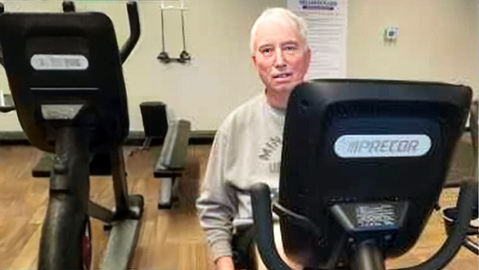Mesothelioma Survivor Shares His Nutrition and Exercise Routine

Fact Checked | Written by: Travis Rodgers | Last Update: 10/24/2024 | 6 Min Read
Mesothelioma survivor Kevin Hession believes that physical activity no matter what your level of fitness, is one of the keys to improving mesothelioma symptoms and treatment side effects. Kevin takes a balanced approach to both fitness and his mesothelioma diet.
Kevin was diagnosed with pleural mesothelioma in August 2021. He underwent decortication surgery in January 2022 and continues to receive chemotherapy.
Kevin told The Mesothelioma Center at Asbestos.com that while he’s adapted his routine since his diagnosis and surgery, walking makes up a huge part of his everyday exercise routine. Maintaining a healthy diet can be a challenge during chemotherapy, but he says nutrition is also an important part of staying healthy, especially for anyone with mesothelioma.
Finding a Workout That Works for His New Normal
Exercising is a major part of his life. But Kevin tells us his routine isn’t the same following his diagnosis and surgery.
“I can walk flat land 3, 4 or 5 miles, but I can’t necessarily do hills,” he shares. “So I can’t do a lot of steps up a stairwell for example. I can walk a floor or 2 but then after that I need to sit down and rest.”
Kevin works to maintain a positive perspective of what he can accomplish now to continue to improve his overall health. He hasn’t let mesothelioma stop him from traveling and staying physically active while on vacation.
“On a treadmill I can walk for 30 minutes at 3.7 miles per hour, but that’s about as far as I can go,” Kevin told us. “When we were in Rome last year, we had 4 or 5 days where we walked in excess of 20,000 steps a day. To put that into perspective 20,000 steps for me is 10 miles. That has helped me physically maintain myself.”
He explains, “I can basically do anything that I want. I can do about 75% of what I used to be able to do before the cancer. Part of that is just the body atrophies just a little bit. You do have a certain amount of fatigue at any given time being on chemo.”
While he finds he can’t lift the same amount of weights he could before during a workout, he can adapt what he does. He says pleural mesothelioma has impacted his breathing, making running a challenge as well.
“I can’t run like I did 5 years ago. I can’t run a 10k race, but I could probably walk a 10k race,” he says. “My breathing is a little bit hampered. So it’s a handicap that I can live with and it’s part of the new normal.”
Staying Active for Physical and Mental Health
Staying in motion is something Kevin says is vital in the midst of his cancer journey. He believes every mesothelioma survivor needs to find ways to remain active despite any physical limitations.
“You have to remain in motion for 2 reasons: No. 1 is the physical aspects of it. Perhaps as important is No. 2, the interaction between other people,” Kevin explains. “You don’t shut yourself away in your house. That doesn’t do anything for you emotionally and doesn’t do anything for you physically. I think being out amongst others you can expand that network like I’ve been doing. It gives me a stronger outlook about who I am, what I’m becoming.”
Kevin shares that his wife has helped him maintain perspective about the challenges of coping with a mesothelioma diagnosis. Her advice keeps him motivated.
“My wife talks about a theory that says take life like a dog does,” he says. “If a dog loses a leg, what does a dog do, it does the most it can on 3 of them. If you have mesothelioma, do the most you can do with mesothelioma.”
“I’m not going to let this disease dictate who I am,” Kevin declares. “I’m taking a different road and I’m going to live life to the fullest and that’s a concept that people need to hear and always have reinforced.”
Kevin warns, “It’s easy to get stuck in a mindset that woe is me or I don’t have the energy to do things like I used to anymore. That may or may not be true. My view is: So what? Do what you can do, don’t focus on what you can’t do and do the best you can with that.”
Eating Right: Healthy Food During Mesothelioma Treatment
Kevin says he sticks to a healthy diet for the most part. He adds that eating an occasional treat is something he believes is a must for everyone.
“I’m trying not to restrict myself,” Kevin explains. Loss of appetite can be a dietary side effect of mesothelioma, making maintaining a balanced diet difficult.
Registered and Licensed Dietitian Tejal Parekh warns that weight loss can delay recovery after mesothelioma surgery and result in longer recovery times between chemotherapy cycles. It can also worsen fatigue.
“I eat anything I want to eat and I typically eat about as much as I want to eat. If I feel like having a dish of ice cream, I will have it,” he tells us. “I won’t do it every night. You don’t want to eat junk food all the time. But if I want to have a handful of chocolate covered popcorn, I’ll have it. And that gives me such a positive outlook.”
There are some dietary restrictions with certain mesothelioma treatment options. Kevin says he takes a measured approach.
“Because I’m on chemo I can’t drink alcohol,” he shares. “But the way I look at it is, if you want to have a glass of wine, have a glass of wine. Not a glass of wine with every meal, but you want to live life, you want to enjoy the life that you have.”
“I’m not afraid to have something with sugar in it,” he adds. “I know there are theories that sugar helps cancer. Almost everything you eat has some level of sugar in it.”
Parekh explains that misconceptions about sugar stem from the complexity of insulin’s relationship with cancer cells. She advises mesothelioma patients to enjoy their favorite sweet treats, but in moderation and not on an empty stomach.
Kevin notes, “If you keep putting these barriers on yourself, it just keeps making things harder. Why do you want to live if you’re going to be miserable?”





